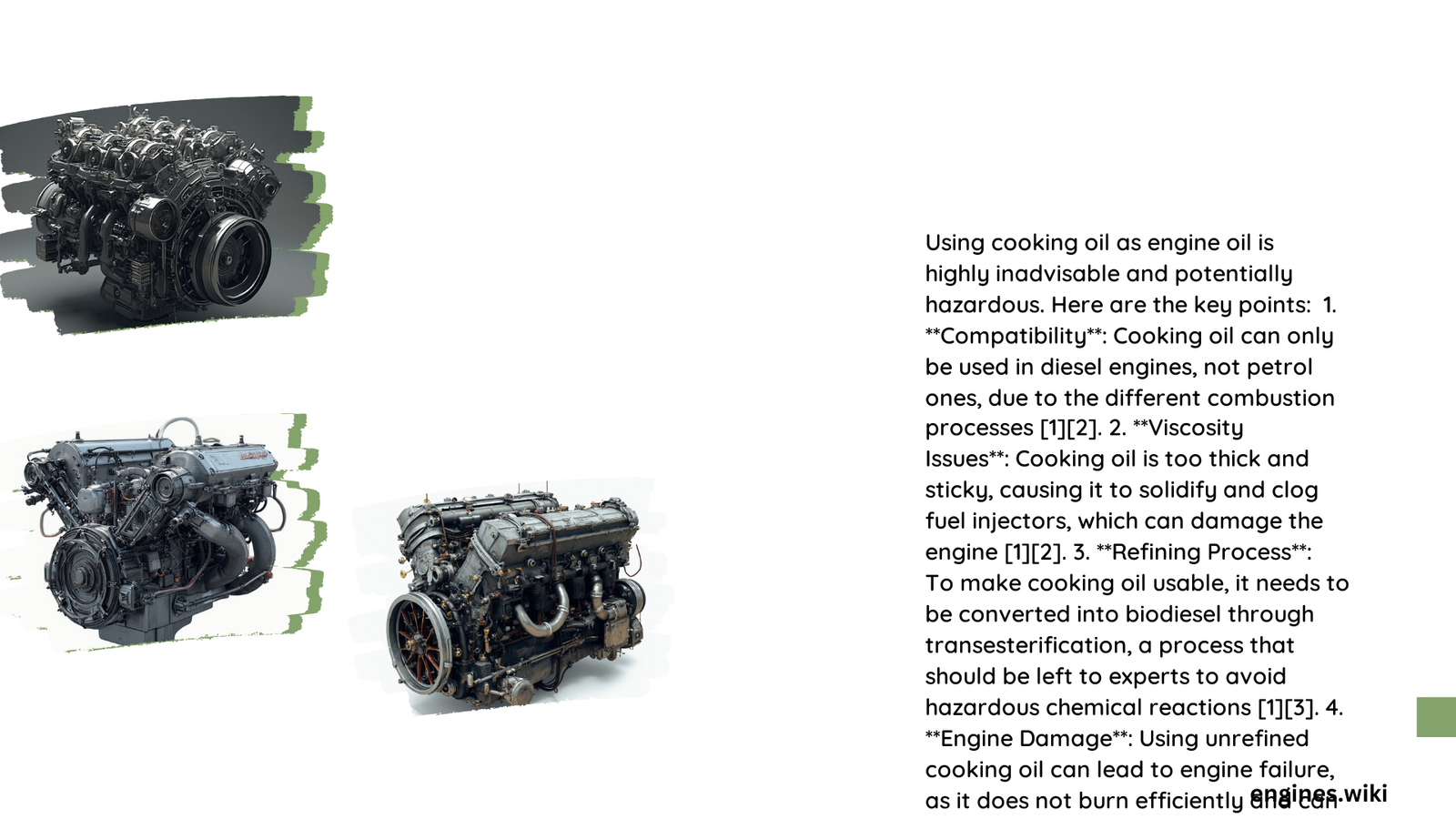Cooking oil as an engine lubricant represents an innovative yet complex alternative to traditional petroleum-based oils. While unconventional, certain vegetable oils demonstrate promising lubrication properties, offering potential environmental and economic benefits. However, direct substitution requires careful scientific understanding of viscosity, thermal stability, and potential engine modifications to ensure optimal performance and longevity.
Can Cooking Oil Replace Traditional Engine Oil?
What Makes Cooking Oil Potentially Suitable for Engines?
Vegetable oils possess unique characteristics that make them intriguing engine lubricant candidates:
| Oil Type | Viscosity Index | Flash Point | Lubricity Rating |
|---|---|---|---|
| Soybean Oil | 223 | 610°F | High |
| Canola Oil | 210 | 595°F | Moderate-High |
| Sunflower Oil | 215 | 605°F | Moderate |
Key Lubrication Properties
- High Viscosity Stability
- Less temperature-dependent viscosity changes
- More consistent performance across temperature ranges
-
Comparable to synthetic lubricants in some scenarios
-
Thermal Characteristics
- Higher flash points compared to mineral oils
- Reduced volatility under extreme temperatures
- Potential for improved engine protection
What Scientific Modifications Are Required?
Successful implementation of cooking oil as engine lubricant demands strategic interventions:
- Chemical Enhancement
- Adding antioxidants to prevent rapid oxidation
- Molecular restructuring for improved stability
-
Reducing polyunsaturated fatty acid content
-
Genetic Oil Modifications
- Developing high-oleic vegetable varieties
- Enhancing oxidative resistance
- Creating more thermally stable oil compositions
What Are the Performance Limitations?
Critical challenges exist when considering cooking oil for engine lubrication:
- Oxidative Instability
- Rapid degradation under high temperatures
- Formation of harmful engine deposits
-
Potential increased wear on mechanical components
-
Viscosity Inconsistencies
- Variable performance across different engine types
- Limited effectiveness in extreme operating conditions
- Potential requirement for frequent oil changes
How Do Costs Compare?
Economic Considerations:
– Initial modification expenses can be significant
– Potential long-term maintenance cost reductions
– Environmental sustainability benefits
Recommended Implementation Strategies
- Start with small-scale experimental applications
- Use genetically enhanced, high-oleic vegetable oils
- Implement comprehensive additive packages
- Monitor engine performance meticulously
- Conduct regular maintenance checks
Expert Recommendations

Professional mechanics and automotive engineers suggest:
– Avoid direct, unmodified cooking oil substitution
– Consult manufacturer specifications
– Consider specialized bio-lubricant formulations
– Prioritize engine manufacturer warranties
Conclusion
While cooking oil shows promising lubrication potential, it cannot serve as a direct, universal engine oil replacement. Careful scientific modification, understanding specific engine requirements, and professional guidance remain crucial for successful implementation.
Technical Limitations
- Not suitable for all engine types
- Requires significant chemical preprocessing
- Performance varies across different vegetable oil sources
